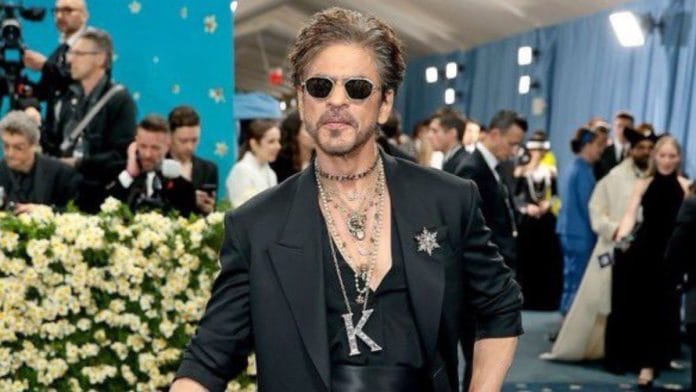New Delhi: Every year, around Shah Rukh Khan’s birthday, fans like me indulge in nostalgia; old interviews, movie behind-the-scenes, rewatching his movies like they’re family heirlooms. But this year feels different. With Cinepolis re-releasing some of his biggest films, I find myself watching them not just as a fan, but as a citizen.
Because the India Khan’s films imagined — and in many ways shaped — feels heartbreakingly distant from the one we inhabit today.
We live in a time when nationalism has been rebranded as aggression. When patriotism is a contest of volume, who can chant louder, hate harder, and accuse faster. A time when love across borders, or compassion across communities, is viewed with suspicion. In this landscape of weaponised identity, Shah Rukh Khan’s cinema — emotional, inclusive, idealistic feels almost like dissent.
A different idea of India
From Swades to Chak De! India, Khan’s body of work consistently offered a gentler, more introspective idea of patriotism. His India was never about domination; it was about conscience. His characters didn’t shout “Bharat Mata ki Jai”; they quietly lived it. Mohan Bhargava’s choice to return from NASA to build a hydroelectric project in a forgotten village (Swades) remains one of Hindi cinema’s most sincere acts of love for the motherland. Patriotism, for him, wasn’t performance. It was participation.
Similarly, Kabir Khan in Chak De! India reclaims his right to belong in a country that suspects him because of his name. “Mujhe states ke naam nahi sunai dete, sirf ek mulk ka naam sunai deta hai – India,” he says — not as a slogan, but as survival. That one dialogue captures the heart of SRK’s patriotism: love, even when it’s not returned.
At a time when Bollywood churns out films like Kashmir Files and The Kerala Story, where patriotism and propaganda blur into fear, Khan’s Jawan (2023) feels revolutionary precisely because it asks citizens to think. “Ab baat karenge vote ki,” his character declares, a line that became a national talking point just before the 2024 elections.
This year, Jawan and The Kerala Story both won National Awards. The irony was impossible to miss. One critiqued the system, the other endorsed its narratives. The dichotomy says more about India’s cultural schizophrenia than any film review ever could.
Khan’s Jawan was a mass entertainer, yes, but it didn’t bend to Bollywood’s new norm of performative patriotism. It reminded us that holding the State accountable is not anti-national, it’s the purest form of love for the nation.
Also read: Age-gap romances are tricky in India. Here’s how Bollywood navigates them
Borders, not battlefields
Decades before that, Main Hoon Na imagined peace between India and Pakistan, and Veer-Zaara portrayed love across borders without villainising an entire country. “Ab tumhe kya lagta hai, hum kabhi dost nahi ban sakte?” Major Ram asks, a question that today might invite trolling, boycotts, and even FIRs. What was once a mainstream dream now feels like a political risk.
Shah Rukh’s cinema, in hindsight, looks like an archive of a more generous national imagination, one where empathy wasn’t treason.
Faith, identity and home
Few stars have explored faith and identity with the same courage. My Name is Khan (2010) gave the world its simplest rebuttal to Islamophobia: “My name is Khan, and I’m not a terrorist.” It wasn’t a cry for validation, but a declaration of dignity. Earlier, in Dil Se, he ventured into India’s fault lines; insurgency, alienation, and state violence, all through the language of love.
Even his so-called “romantic” films — DDLJ, Pardes, Kabhi Khushi Kabhie Gham — carried an undercurrent of soft nationalism. He became the NRI with a heart that beat for India, not through chest-thumping but through memory and longing. His diaspora was never divided; it was emotionally tethered to home.
Watching those films today, I realise what makes Shah Rukh Khan endure. His patriotism is not the nationalism of our times, loud, suspicious, performative. It’s rooted in empathy, plurality, and a faith in dialogue.
He doesn’t sell us an India that must be defended. He shows us one that must be loved back to life.
At a time when cinema is used to manufacture hate, revisiting Khan’s filmography is a quiet act of resistance. Because in his world, the hero doesn’t conquer the nation, he heals it. Khan’s patriotism isn’t about jingoism and propaganda, it’s what his whole brand is — love.
(Edited by Saptak Datta)







A Kashmiri Muslim, enjoying the freedoms and rights enshrined in the genuinely inclusive and secular Indian Constitution, waxing eloquent on ’empathy, love and mutual respect’ is an irony in itself. Quite possibly, she would not even identify herself as an Indian when visiting/staying abroad. From my time studying at University at Buffalo (UB), I can confirm that most Indian Kashmiri students at foreign universities refuse/squirm to identify themselves as Indians. When asked, their reply is always – ‘Am Kashmiri’ or ‘Am from Kashmir’. It’s never ‘Am Indian’ or ‘Am from India’. To hear such a person pontificate on ‘patriotism’ brings forth a chuckle at best.
As for Shahrukh Khan – his silence on India-Pak conflicts and ISI sponsored terror attacks on India speaks loud and clear. He does not need an interlocuter or interpreter. Hence, Ms. Qundeel’s effort to be one is in vain.